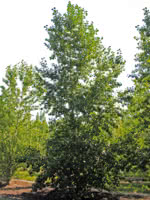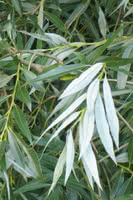Mon-Fri 9am - 5pm Mountain time
Tristis Poplar vs Silver Leaf Willow
Populus x Tristis
Salix alba var. sericea
NOT AVAILABLE THIS SEASON - MIGHT RETURN
NOT AVAILABLE THIS SEASON - MIGHT RETURN
Tristis Poplar is a large deciduous tree. It is cold hardy, disease resistant, and relatively drought tolerant. Tristis Poplar loses its leaves later in the year than other Poplars, making it a great ornamental tree in fall.
It's known for its strongly scented balsamic buds and yellow foliage in autumn. Because of its size, Tristis Poplar is most suitable for large properties and will help prevent wind erosion.
Tristis Poplar is slower-growing than many newer hybrids, for a longer useful lifespan. Tristis grows especially well in the southern prairies due to its resistance to cold dry winds.
Silver Leaf Willow has orangish bark and long, silvery grey leaves. Bees and other insects are attracted to its flowers.
Popular as an ornamental tree for parks, it is also used as a shelterbelt species. It may not be as cold hardy as some of the other willow varieties, however.
Tristis Poplar Quick Facts
Silver Leaf Willow Quick Facts
In row spacing: 2.4 m (8 ft)

